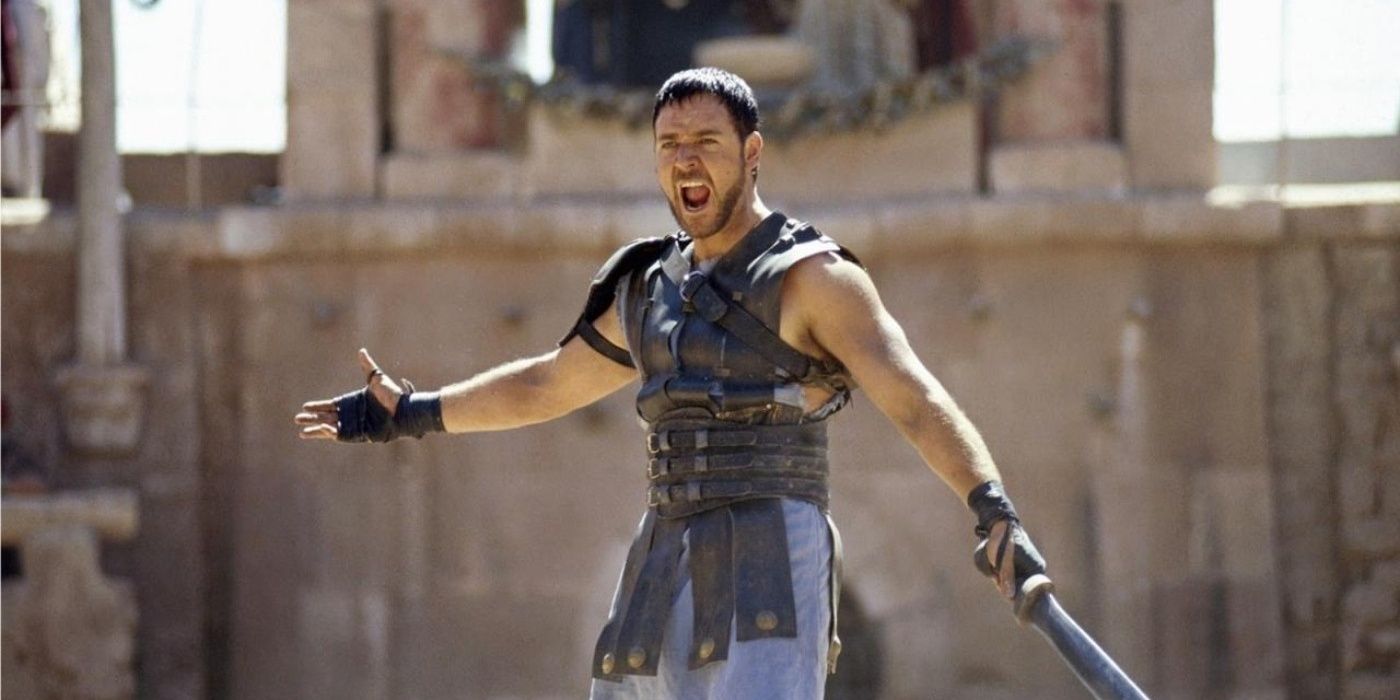The cinematic impact of Ridley Scott’s Gladiator has been felt since its inception and has fueled the anticipation for the long-awaited 2024 sequel. Russell Crowe’s Maximus is a hero in every sense of the word, wrongfully stripped of his battle-tested valor and forced to fight his way back to enact vengeance on his greatest enemy, the usurper Commodus, for killing his beloved wife and child. While flawed, particularly in areas of plot development and historical accuracy, Gladiator excels as an immersive entertainment vehicle with some of the most enthralling sword-and-sand action sequences ever put on film.
Gladiator
- Character(s)
-
Maximus Decimus Meridius
, Commodus
, Lucilla
, Lucius
, Marcus Acacius
, Macrinus
Gladiator is an emblem of 21st-century Hollywood epics and a significant representative of the action blockbuster as prestige cinema. It is only one of eight action movies to ever win Best Picture and one of three since 2000, with 2022’s Everything Everywhere All At Once being the most recent as an action-comedy hybrid. Gladiator also features what is arguably Crowe’s career-best performance as the titular protagonist, which solidified him as a global star. Unlike Scott’s later historical fiction epics such as Napoleon and Exodus: Gods and Kings, Gladiator revels in its lack of complexity as a timeless saga of retribution.
Gladiator Trades Sharp Story Logic For Gripping Action Scenes & Fierce Showdown Set-Ups
Gladiator’s Characters Are Often Catalysts For Specific Plot Points Rather Than Driving Narrative Forces
Gladiator‘s scale is one of its most impressive elements, complemented by the impressive contributions of its immaculate set pieces and advanced visual effects, which still hold up today. This creates a convincing backdrop and world for Maximus to move through that never distracts from the narrative. Gladiator’s atmospheric legitimacy allows us to be more forgiving of its logistical flaws, especially those of its screenplay. While some scenes linger to the point of exasperation, others possess abrupt tonal shifts that feel manufactured and rushed. In one scene, Commodus flips from pitiful weeping to political scheming in a nearly comical way.
While a one-on-one battle between Maximus and Commodus at the center of the Colosseum is an epic ending by design, Commudus’s eagerness to battle Maximus defies the cowardice he demonstrates throughout the entire film.
Most of these story logic flaws are ostensibly inserted to set up the film’s most exciting moments, especially towards the end of its second act. The film’s most glorious and adrenaline-pumping moments extend their collective value and effect throughout its slower parts. Still, some of these dull and unlikely story choices can’t entirely make up for the better moments they set up. While a one-on-one battle between Maximus and Commodus at the center of the Colosseum is an epic ending by design, Commodus’s eagerness to battle Maximus defies the cowardice he demonstrates throughout the entire film.
Crowe & Phoenix Enhance Their One-Dimensional Characters With Commanding Presence
The Oscar-Winning Actors Added Depth & Distinction, Enhancing Their Straightforward Characters
Neither Maximus nor Commodus are entirely full-bodied, as their motivations and overall character developments are effective yet disappointingly straightforward. Crowe seeks vengeance against a powerful system and its tyrant; Phoenix demands order and validation he never received from his father, Marcus Aurelius. While the binary good versus evil dynamic works well and is fundamentally sound, it’s not much more sophisticated than a standard Disney premise. Gladiator proves it doesn’t have to set up anything more than an idealized hero against an absolute villain. Considering the evolution of villains in cinema in more recent years, however, Commodus appears overtly one-dimensional.
Without Crowe and Phoenix adding their particular depths to Maximus and Commodus, respectfully, Gladiator would have arguably been a lesser product.
Oscar winners Crowe and Phoenix essentially had to lean into the obvious qualities of their characters to refine and uplift them to a near-Shakesperean quality. Without Crowe and Phoenix adding their particular depths to Maximus and Commodus, respectfully, Gladiator would have been a lesser product. The reserved grit Crowe infuses into Maximus might not have been felt in performances by Tom Cruise or Antonio Banderas, who were both considered for the part. Equally, Phoenix’s piercing glances often say more than his brooding and tiresome dialogue, showcasing how essential he is to Gladiator’s success.
Despite Phoenix’s fantastic performance, he lost the Supporting Actor Oscar to Traffic’s Benicio del Toro.
Ultimately, both actors rise above the demands of their characters to create truly iconic scenes, memorable quotes, and palpable tension. Gladiator thrives because it has more heart than Scott’s other historical epics and creates a true hero protagonist who is universally beloved and natural to support. As a reluctant but necessary leader, Maximus is the ultimate form of nobility, which makes his defeat of Commodus intensely gratifying and his escape to the afterlife tear-worthy. While Crowe is not involved in the Gladiator sequel, Maximus’s legacy is felt in every frame as it has been in the modern action genre.

The Gladiator franchise is a historical epic series that began with the 2000 film directed by Ridley Scott. The story follows Roman General Maximus Decimus Meridius, who is betrayed and forced into slavery, where he rises to become a gladiator and seeks revenge against the corrupt emperor Commodus. The film was a critical and commercial success, winning multiple Academy Awards, including Best Picture and Best Actor for Russell Crowe. The franchise is set to expand with a highly anticipated sequel, Gladiator II, slated for release in 2024, which will continue the story with a new generation of characters.
- Russell Crowe and Joaquin Phoenix rise above the writing to give memorable, layered performances
- The action sequences are fantastic and still look great
- Character motivations are straightforward and the performances amplify them
- Some scenes linger longer than necessary and there are abrupt tonal shifts

